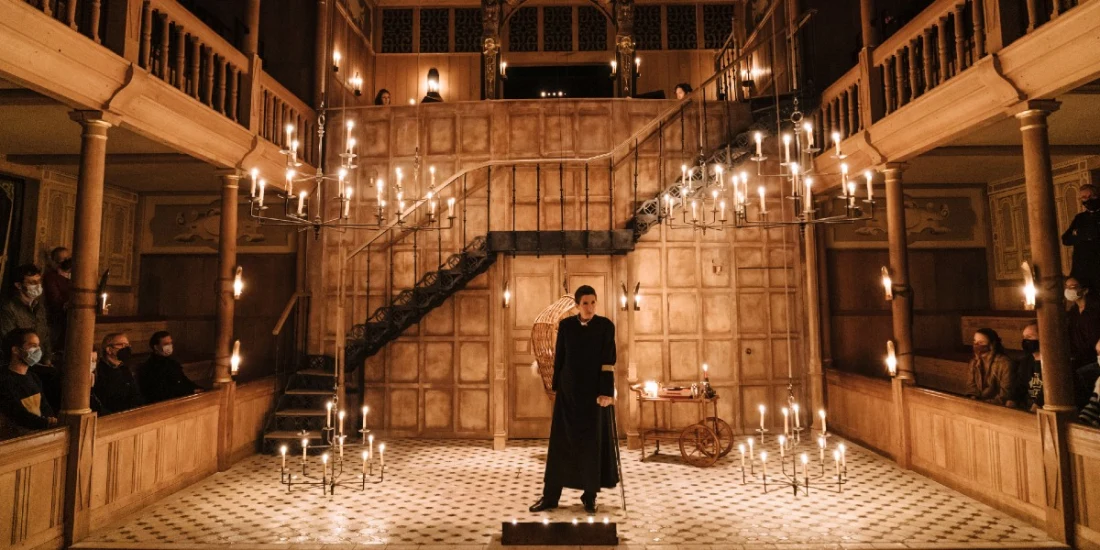'Measure for Measure' at Shakespeare's Globe review — a surprising and delightful twist on the Bard's comedy
Shakespeare's prickly, ever-intriguing play Measure for Measure is given a genuinely fresh spin courtesy of Blanche McIntyre, the busy director marking her best production in years with this provocatively gender-flipped approach to a text that itself shifts moods on a dime. With Hattie Ladbury in superlative form as a quirky, diffident Duke who knows a thing or two about camouflage and deception, the staging follows on from Metamorphoses in a prime season so far at the Globe's indoor space.
The time period in this instance is the 1970s amid an era of electrical outages that accounts for a blackout early on, following which the Wanamaker's signature candles can be introduced. Ladbury is an arresting presence from her first entrance, hobbling into view with a cane and shouting imperiously at Escalus (Ishia Bennison, doubling brilliantly as the hapless, and here very sloshed, Barnadine). For 19 years, we're told, Vienna has descended into a state of debauchery, hence the Duke's desire to put Angelo in charge in her (in this instance) absence, while she disguises herself as a friar: much easier that way to survey the goings-on in her midst.
Does "power change purpose"? That's the overriding question of a play that allows Ashley Zhangazha's Angelo to announce himself as "the voice of the recorded law" even as he puts the make on the novitiate, Isabella, whom Georgia Landers plays with a palpable strength that cuts gratifyingly against the sometimes-insipid reading of this role.
McIntyre plays up the comic potential of a play generically classified as a comedy for the simple reason that people get paired off at the end, no matter how ill-advisedly one or another coupling might be. Along the way we have Daniel Millar's Elbow presented as this play's equivalent to Dogberry from Much Ado About Nothing — another antic constable — whilst the excellent Josh Zaré lends unusual gravitas to Claudio, Isabella's doomed brother. Readying himself for "darkness" as a bride, this Claudio hints at Hamlet in his musings on mortality in all its strangeness and mystery. He's a man "out of love with life" in a play fringed at every turn by death. (One finds Much Ado, as well, in this play's plot reliance on a perceived death that turns out not to be the case.)
A Tamsin Greig lookalike as she might appear redrawn by Modigliani, Ladbury throughout is funny but also furious, whether voicing the quid pro quo that is the play's title or beating the stage floor with her walking stick in a repeated demand for justice. Returning after an unexplained absence, she is greeted with applause that spreads to the house — a nice touch roping in a Globe public used to that sort of rapport from the same building's outdoor space. Resembling a weirder (and older) Little Bo-Peep in her head scarf and sensible shoes, Ladbury's Duke gets jerkier and more deliberately mannered as she moves towards a would-be way forward with Isabella which catches the younger woman very much unawares: I never thought I'd see suppressed lesbianism as the motor for this particular narrative, and the conceit works to spine-tingling effect here.
The result only marginally sidelines the edgy, fraught Angelo-Isabella dynamic that tends to dominate. That said, Zhangazha conveys the warped rectitude to Angelo that is seen to unravel — "this deed unshapes me quite" is his self-assessment — and Landers charts the no-win situation confronted by Isabella reeling from the predatory clutches of Angelo into the scarcely more comforting ones of this Duke.
But the entire evening is well-cast, with attention due, as well, to Eloise Secker, who doubles as a purposefully androgynous Pompey at one point seen waving a dildo (don't ask) and as a sunglasses-wearing Mariana, Angelo's ex, whose bed trick fuels the notably peculiar plot. I could have done without the forced jollity of the curtain call, notwithstanding the expectation of that very thing in the yard upstairs, but I shan't soon forget the awkward bow in the direction of Isabella made by a Duke who looks on the verge of laying bare her own conflicted desires. At such moments, a play about disguise gains in meanings I had never thought possible in a production that ranks as one of this year's most pleasurable surprises.
Photo credit: Hattie Ladbury as the Duke in Measure for Measure. (Photo by Helen Murray)
Originally published on
